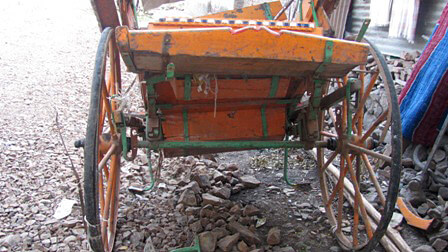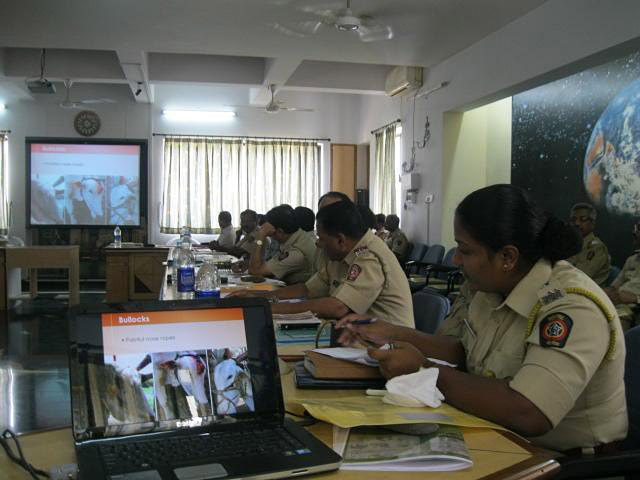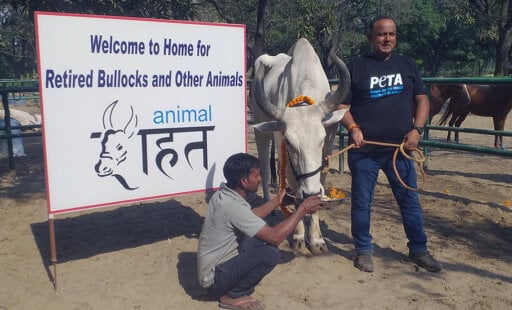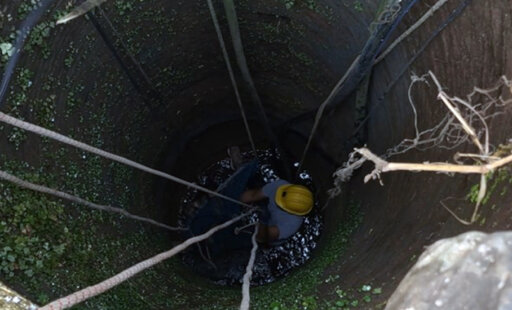A “tonga” is a two-wheeled, horse-drawn passenger cart—a horse taxi, if you will—that you can find all across India. Tongas are pulled by ponies who are forced to work all day long on hard pavement and rutted dirt roads under the scorching sun or through driving monsoon rains. The carts are generally made to support only the weight of the driver and two or three other passengers, but it is common to see them overloaded with as many people crammed in as possible.

This month, the Animal Rahat team brought relief to a pony named Rama who was suffering from painful wounds on his neck and legs. Rama’s owner, Mr. Kharat, had allowed his tonga to deteriorate into such a state of disrepair that it was off balance, unsteady, and extremely hard for Rama to pull—to the point that his harness was cutting into his flesh!
Mr. Kharat did not have enough money to get the tonga repaired himself, so an Animal Rahat staffer met with head of the local tonga drivers’ union to come up with a solution. As a result, the union leased a new tonga to Mr. Kharat temporarily and provided financial help to get the broken tonga repaired.

That’s just one small example of the immense difference that Animal Rahat makes every day in the lives of suffering animals—and an illustration of how the program is changing the very nature of how owners of working animals see their responsibilities to these vulnerable animals.
Animal Rahat also held meetings with a group of tonga owners in the Ichalkaranji area of Sangli. During the first meeting, each owner was asked to describe a contribution he had made that benefited his family or that benefited society and that made him feel good about himself.
Then the owners were asked, “Who did the labor that made that contribution possible?” Initially, all the owners answered, “I did.” The Animal Rahat veterinarians asked, “Only you?” On further reflection, the drivers added, “With the help of my pony.” With a bit more questioning from the Animal Rahat veterinarians, the drivers eventually agreed that it was actually their ponies who did almost all the labor that made the owners’ contributions possible!
This simple but powerful paradigm shift instantly helped the owners view their duties to their ponies from a new perspective, and rather than see ponies only as tools to be exploited, the men began to assign greater value to the crucial role that the ponies play in their livelihoods. They began to see that these animals deserve to be treated with some care and compassion.
Through subsequent meetings, the men agreed that they would become a “self-help” group. Changes have included a reduction of cart-overloading instances, an increase of owners pointing out harmful practices to one another (and correcting them), and the establishment of a system whereby each owner makes a monthly contribution to a community account that will help pay for cart and harness repairs.

The Animal Rahat team is now working to organize similar groups in other locations. An initial effort to form such a group among bullock cart owners failed earlier this month when all the men (except three) expressed skepticism about the value of preventative care for their bullocks. So the Animal Rahat team invited the three open-minded bullock cart owners to a meeting of the tonga owners’ group. Success! The three bullock owners were so impressed with what the tonga owners told them that they convinced 10 of their peers to go with them to the next tonga owners’ meeting. They did so, and now the bullock cart owners have their own group as well!
Clearly, as these groups increase, countless ponies and bullocks will be spared immeasurable suffering.
This month also brought two exciting examples of Animal Rahat’s efforts to work in concert with the police force to help animals. When Animal Rahat learned that a bull race was scheduled in Bhalwani, the team immediately contacted the police. Animal Rahat staff convinced the officers to enforce the new law that bans bull races. When bull owners began to gather, Animal Rahat and the police were there. Together, they shut the race down before it could begin!
In addition, Animal Rahat organized a workshop attended by police inspectors from every police station in Sangli to review India’s cruelty prevention laws and the ways in which these laws are commonly defied at working animals’ expense. As a result, in the first action of its kind, the district superintendent of police requested materials from Animal Rahat to display in police stations regarding the enforcement of anti-cruelty statutes, and he personally requested that the officers make a special effort to intervene whenever they see working animals treated illegally. If you know the police in India, this is a huge victory!

This type of educational outreach to law enforcement is a first. A follow-up meeting with the district superintendent of police is already scheduled to take place in two months. Animal Rahat looks forward to conducting more of these workshops and nurturing this relationship with law-enforcement officers—it holds such promise for a better future for animals.
Here are photos of just three of the many other individuals who would also thank you if they could for their rescue this month. You may recall that last month I sent a photo of two rescued puppies at the Animal Rahat sanctuary whose mother had been killed in an accident. (They have since been named Nancy and Paul in honor of the wedding of vegetarians Sir Paul McCartney and Nancy Shevell.) Well, here’s a snapshot of their two adorable siblings who have now joined the sanctuary family. Also joining the family is a donkey named Bond. He was rescued when Animal Rahat found him abandoned with a deep nasal wound—most likely caused by an accident. Bond is responding well to treatment, and his prognosis is good. Thank you for helping Animal Rahat come to the aid of so many souls in need! They couldn’t do it without you!





